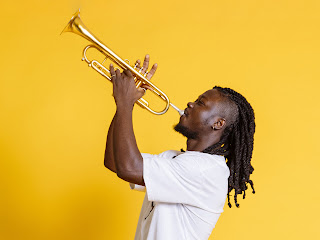The team at ACT Music continues to bring extraordinary music into the world and I've been listening to the utterly brilliant 'Highlife' from Rotterdam based, Ghanaian trumpeter Peter Somuah. The influences in Somuah's music comes from iconic trumpeters Miles Davis, Freddie Hubbard and Roy Hargrove, alongside the music of Ghana - especially the 'highlife' rhythms of the 1960s. However, the overall result is an individual, stylish and infectious album.
Somuah's compositions are inventive and truly toe-tappingly vibrant. His band includes Dutch musicians alongside a Dutch-Surinamese percussionist: Peter Somuah (trumpet, vocals, cowbell), Jesse Schilderink (tenor sax), Anton de Bruin (keyboard, rhodes, synth), Jens Meijer (drums), Danny Rombout (congas, shekere), Marijn van de Ven (double and electric bass), Lamisi Akuka (vocals), Thomas Botchway (talking drum & shekere), Pat Thomas (vocals), Gyedu-Blay Ambolley (vocals), Bright Osei Baffour (guitar). The bandleader himself says: "My fellow players didn't grow up in Ghana, but that doesn't matter at all. Their deep passion for highlife and afrobeat and the feeling they have developed for this music are the most important things."
Somuah's compositions are inventive and truly toe-tappingly vibrant. His band includes Dutch musicians alongside a Dutch-Surinamese percussionist: Peter Somuah (trumpet, vocals, cowbell), Jesse Schilderink (tenor sax), Anton de Bruin (keyboard, rhodes, synth), Jens Meijer (drums), Danny Rombout (congas, shekere), Marijn van de Ven (double and electric bass), Lamisi Akuka (vocals), Thomas Botchway (talking drum & shekere), Pat Thomas (vocals), Gyedu-Blay Ambolley (vocals), Bright Osei Baffour (guitar). The bandleader himself says: "My fellow players didn't grow up in Ghana, but that doesn't matter at all. Their deep passion for highlife and afrobeat and the feeling they have developed for this music are the most important things."
Combining rhythms from his native Ghana with the jazz stylings of his heroes, Somuah recorded the tracks in a small backyard studio in Berlin-Neukölln using vintage analogue equipment, before taking them on a trip in both geography and time. Peter flew to Ghana with the instrumental tracks and visited some of the heroes of the old highlife genre such as Pat Thomas and Gyedu Blay-Ambolley. "During my childhood, I used to hear their songs on the radio all the time. Back then, I would never have dreamed that I would one day be sitting in their living rooms to record them for my album."
The opening track of Highlife is something of a history lesson, with highlife legend Koo-Nimo in Kumasi explaining the origins of the music. Back when the British colonial rulers employed bands of Ghanaian musicians, and asked them to perform waltz, samba and Western popular music, it was played exclusively in British clubs and casinos for the pleasure of the upper classes – hence the name ‘highlife’. Most locals, on the other hand, were only allowed to admire the music from the outside. Somuah says: "Later, the musicians brewed their own mixture. They combined Western instruments with older Ghanaian styles such as palm wine music." They brought dancing highlife guitar riffs into play, and other offbeat rhythmic patterns too, notably the ubiquitous clave.
The whole album is a real delight, but especially Chop Chop, which includes vocals from the veteran Gyedu Blay-Ambolley, contributing his own composition and style to Somuah's masterpiece.
The whole album is a real delight, but especially Chop Chop, which includes vocals from the veteran Gyedu Blay-Ambolley, contributing his own composition and style to Somuah's masterpiece.
In that track, as elsewhere across Highlife, there's a real self-expression and Somuah talks about the importance of the narrative in his own music, and the traditions of highlife. He contributes vocals on the moving Mental Slavery and says: I'm talking about the enduring legacy of the colonial era: many Ghanaians are still mentally enslaved, see themselves as inferior. They don't dare to proudly present themselves and to contribute their skills."

Comments
Post a Comment